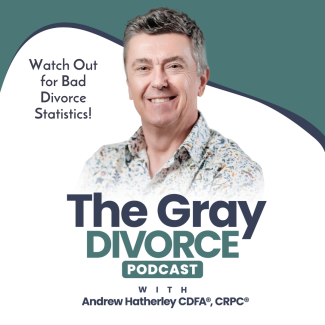
The Gray Divorce Podcast: Episode 19 Watch Out for Bad Divorce Statistics!
Announcement: Welcome to The Gray Divorce Podcast, hosted by divorce financial analyst and retirement planning counselor Andrew Hatherley. Join Andrew and guest experts as they help late-life divorcees build the financial and mental foundation for a meaningful future. There is life after divorce. Now on to the show.
Andrew Hatherley: Hey everyone! Welcome to episode 19 of the Gray Divorce podcast. Today's episode is going to be short and sweet. Because what I really want to do is to get across one key point. And that's that we always need to be skeptical of some of the more outlandish statistics we may see posted on social media.
Even if those statistics are posted by people with otherwise notable reputations.
It's always important to know the source of some of the more provocative numbers that are cited by divorce professionals. or anyone for that matter.
So, what am I talking about?
Recently, I came across a social media post from a prominent divorce professional that stated that in the year after divorce the standard of living for women goes down 27% while for men it goes UP 10%.
As a divorce professional myself, having worked with dozens of men and women going through the difficult economic transition brought about by divorce, and having experienced my own divorce at the age of 52, I was shocked by this statistic.
I wasn't shocked by the suggestion that women suffer a greater economic penalty after divorce than men. I think all divorce professionals agree that this is true.
But we'll get into that a little bit more later.
I was shocked by the statement that the standard of living for men could possibly go up one year after divorce.
I know for me it certainly didn't after my divorce. But of course, I'm a sample size of 1.
So, I was curious. What is the source of this statistic?
I began by politely asking the divorce professional who published this provocative statistic on LinkedIn where this data came from.
My request was ignored.
Another financial professional challenged the statistic posted as well and was met with some very defensive responses but once again the person gave no citation of the source of the statistic.
So, I decided to do some digging of my own.
In doing so, I found the original academic paper claiming that men’s standard of living goes up 10% after divorce while women are estimated to suffer a 27% decline.
So, drum roll please.
The paper was written by Richard R. Peterson of the Social Science Research Council and his paper was published in the American Sociological Review in 1996.
Here are some important things to note about Peterson's paper.
His work is a re-examination of data originally reported by Lenore Weitzman in her book The Divorce Revolution in 1985. Apparently, scholars felt the need to re-analyze Weitzman's data given that she reported, rather remarkably, that the average decline in standard of living after divorce for women was 73% while men's standard of living improved by 42%.
Suffice to say more than a few people found these numbers rather unbelievable.
Where did these numbers come from?
Well, Weitzman’s original data was drawn from the court docket of divorces recorded in Los Angeles County between May and July of 1977. She conducted interviews with an equal number of men and women making up 228 divorcing couples.
Peterson, in his 1996 article, found errors in Weitzman's research and came up with the revised numbers mentioned at the beginning of this discussion.
But I ask you dear listener, should divorce professionals in 2023 cite as fact, statistics based on:
- an incredibly small sample size of 228 couples
- in Los Angeles County
- in 1977. 46 years ago.
The answer is obvious. No.
Please understand. My intention here is not to minimize the gender gap that still exists between men and women when it comes to standard of living after divorce. My point is no one, men or women, are served if important conversations about the economic consequences of divorce don't start with the truth.
So, what is the truth?
Well, I think a more relevant source nowadays would be an article written by I-Fen Lin and Susan Brown in the Gerontological Society of America in 2020. The article is titled The Economic Consequences of Gray Divorce for Women and Men. As a side note, the authors Susan Brown and I-Fen-Lin have an excellent academic reputation and are responsible for the groundbreaking article The Gray Divorce Revolution, published in 2012, which highlighted the phenomenon of growing divorce rates among people over age 50.
In their 2020 report, Brown and Lin use more recent data to show that women experienced a 45% decline in their standard of living (measured by an income-to-needs ratio), whereas men's standard of living dropped by 21%. These declines persisted over time for men and women indicating that gray divorce operates in what they call a “chronic economic strain” for both women and men. Interestingly, they noted that economic decline for women might be reversed following re-partnering which essentially offset women's losses associated with gray divorce. But, because so few women (or men) do re-partner, it's not a viable solution for recovering financial losses associated with gray divorce.
The authors found no gender gap emerging for changes in wealth following divorce, with both women and men experiencing roughly a 50% drop. That would make sense given that marital assets are typically split in divorce.
We'll certainly be continuing this discussion in future episodes of The Gray Divorce Podcast.
The point that I would like to reiterate is that no one, men or women, are served if important conversations about the economic consequences of divorce don't start with the facts.
Announcement: Thanks so much for tuning into this episode of The Gray Divorce Podcast. To learn more or get in contact with your host, you can visit Andrew's website at TranscendRetirement.net. Also, please feel free to rate, subscribe, and leave a review wherever you listen to your podcasts. That helps others find the show and we greatly appreciate it.
Thanks again for listening, and we'll catch you in the next episode.
Andrew Hatherley: Information provided is educational only and should not be construed as legal or tax advice. Each situation is unique and should be discussed with your tax or legal advisor prior to implementation. Andrew Hatherley is not an attorney and does not provide legal advice. Information provided is financial in nature.
Advisory services offered through Hatherly Capital Management, LLC. Divorce Financial Analysis Services offered through Wiser Divorce Solutions and affiliated company

